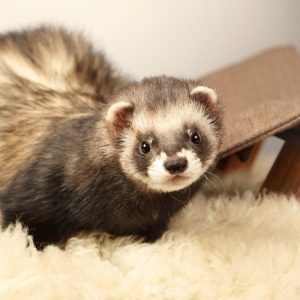
From their cute and cuddly nature to their mischievous antics, today we learn why ferrets may be your new best friends! Like cats, they love to nap and usually sleep up to 20 hours a day. When they are awake, however, they are very active and playful pets. They are highly intelligent and social pets who love to bounce around and invite you to play with them. Here’s everything you need to know to see if a ferret is the right pet for you:
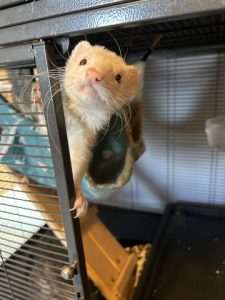
Habitat
Ferret cages should be a minimum of 18 x 18 x 30 inches and have two or more levels with stairs or ramps they can climb. Wire cages work best. Avoid using aquariums as they have very poor ventilation. The cage should have very small gaps and a secure latch to prevent them from escaping, The floor should be covered in washable carpet, linoleum flooring, etc. as the wires can hurt their little feet.

You should provide your ferrets with hammocks or shelves to perch on, as well as some sort of dark enclosure they can nest in. Bedding, such as towels or blankets, should be washed often. As for toys, stick to the ones that encourage the ferret’s need to burrow or hunt. For the hunting aspect, they enjoy playing with small balls, feather cat toys, or small cloth baby toys.
Ferrets should be kept away from direct sunlight. A cool, shaded area is best. Hot weather can be a worry, so if you know the temperature is above 80 degrees, be sure to check on the ferret often and point a fan at the cage if possible.
Diet
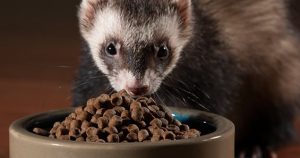
It is a very good idea to allow your ferret to experience a variety of different foods at an early age, so they become accustomed to different flavors and diets. The absolute best diet for a ferret is whole prey foods, such as mice and rats. Understandably, many may not feel comfortable feeding that to their pet, so the next best option would be either a specialized ferret commercial diet made specifically for their nutritional requirements, which should be meat based, not have many carbohydrates and contain 32-40% protein and 10-15% fat.
If you want to give your ferret a treat, the best option would be a small piece of high-quality meat, such as chicken or turkey. Even though they may like the taste of sweet foods like fruits, it is best not to feed them those as treats either.
If ferrets are being fed an appropriate high-quality diet, they likely won’t require any supplements other than maybe a fatty acid supplement to help with dry coat and flaky skin.
Fresh water should always be available to your ferret and changed regularly.

Social Beings
Ferrets love the companionship of other ferrets for comfort and play. They don’t cope well living alone and should be kept in pairs or groups. So make sure you get more than one and have enough space. You’ll often find them having an impromptu play, charging around their enclosure and springing at each other.
Exercise & Mental Enrichment
Ferrets need daily exercise and mental enrichment and therefore should not be caged 24 hours a day. They need to be able to explore additional environments for about 2 hours each day. But they should always be supervised when outside of their cage. The areas you allow your ferret to explore should be very strictly “ferret-proofed”. For example, you should make sure they cannot reach any electrical wires, dangerous substances or breakable items. Cover any gaps they can fit through, such as under doors, windows, and dryer vents. They have been known to escape the house this way.
They also need toys that challenge them and encourage movement like tunnels, searching for food, boxes to climb on or in, etc, providing ample opportunity for the ferrets to exercise.
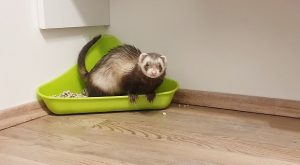
Litter Box Training
One thing that makes ferrets so easy to care for, is that they can be litter box trained. You should provide them with several litter boxes – one in their cage and multiple boxes in their playing area. Ferrets have a very fast metabolism, so when they have to go, they go. Therefore, they should always have a box, pee pad or newspaper very close by. Since ferrets do not cover their feces, there’s no need to fill the box with litter. Simply spread a thin layer over the bottom so they know where to go.
Do not use clumping or clay cat litter for your ferrets. This type of litter is very dusty and can cause breathing problems for your ferrets. Wood shavings (pine or cedar) are also not a safe choice because they contain “essential oils” (aromatic hydrocarbons, phenol). These oils release vapors, which then can cause respiratory damage and dramatic changes in liver enzymes. Pelleted litters are the best choice. The pellets are heavy enough to remain in the litter pan when the ferret steps out. They contain much less dust than other litter types, they are highly absorbent, and they are easily scooped.
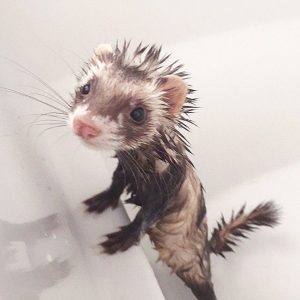
Grooming
Ferrets are naturally clean animals, and do not require much grooming. However, they are very well known for their musky odor. No matter how many times you bathe a ferret, the odor will never completely go away and you really shouldn’t bathe them more than once a month because it ill strip its skin and coat of all the natural (mildly stinky) oils, which will cause the body to overcompensate and keep producing more and more. This scent is much worse in unneutered ferrets, but luckily almost all the domestic ferrets in North America are neutered at the time of weaning, so you shouldn’t really have to worry about this.
They also have a pair of anal glands like cats and dogs, with very strong-smelling secretions. They rarely express these anal glands unless very scared and the scent often goes away after a few minutes. However, most ferrets you find around here have already had these glands surgically removed, so you only must deal with a mild musky odor from the oils in the skin.
So, keep bathing to a minimum since they usually do a pretty good job of cleaning themselves much like a cat. If you give them a bowl of water, they will use it to clean their face. Bathing is, however, good for relieving itchiness caused by fleas or dry skin. If you are going to bathe a ferret, make sure you use pet-friendly shampoo and warm bath water.
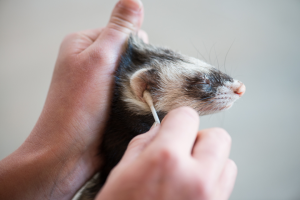
Health
Just like with every other pet, ferrets have their own set of potential health issues and should be examined by a vet regularly. Vaccines are highly recommended, specifically for rabies and distemper. They are also at a pretty high risk for fleas and should always be treated with a monthly preventive.
It’s also important to note that their ears tend to get quite waxy, and they would benefit from a regular ear cleaning every two weeks or so. Make sure you use a pet-friendly ear cleaner. It is also recommended to regularly trim your ferret’s nails at least every couple of weeks, as they can get quite long and sharp and potentially get caught in bedding, carpet, etc. and cause injury. You should ask a veterinarian to show you the proper way to clean your ferret’s ears and trim its nails to prevent any unintentional damage or harm.

Ferrets can make wonderful, entertaining, and intelligent pets! They are social and inquisitive companions, and they are such a joy to have around.





Leave a Reply